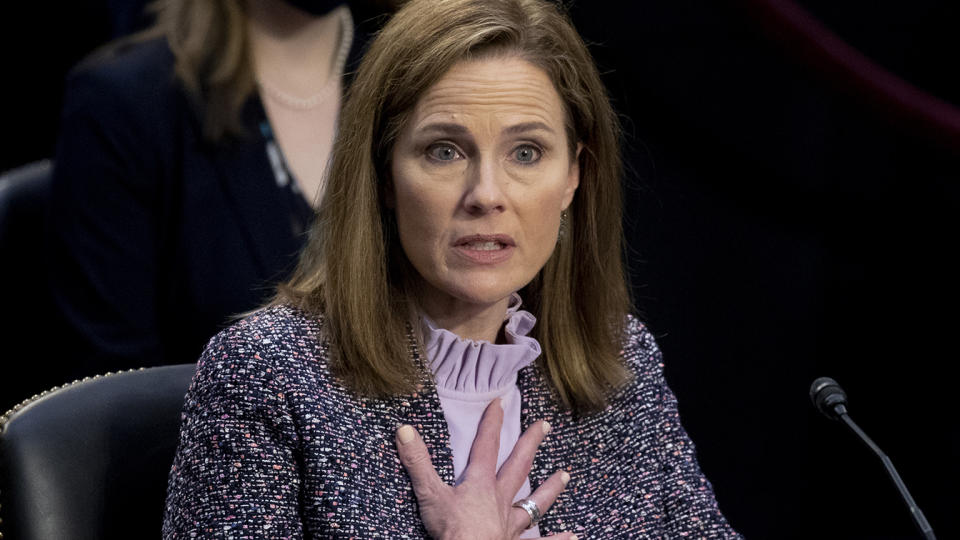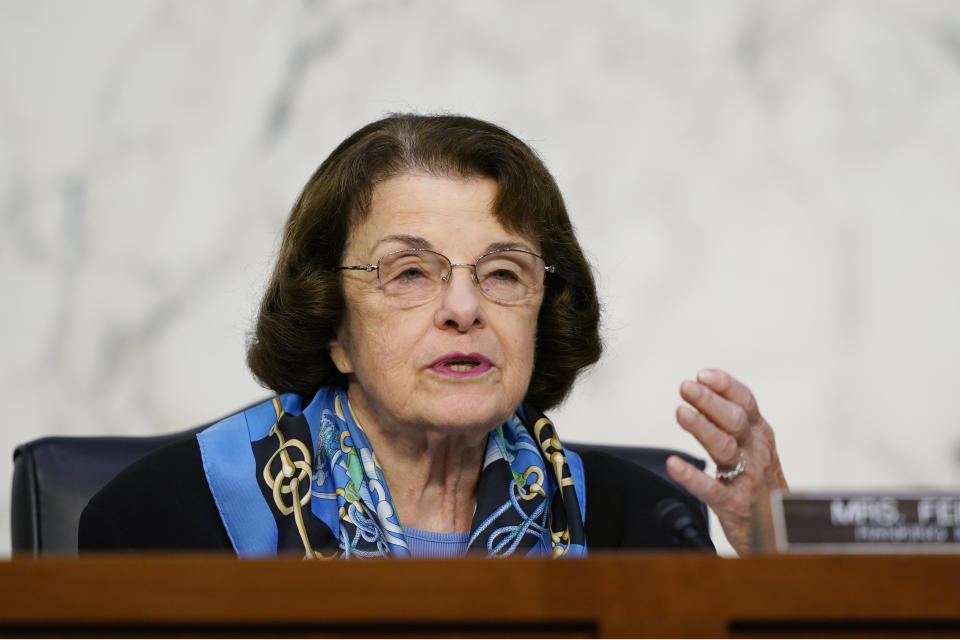Dems get no satisfaction from Barrett on Voting Rights Act
WASHINGTON — With what could be a contested presidential election already underway, Supreme Court nominee Amy Coney Barrett pointedly declined to say where she stood on the Voting Rights Act and other issues related to voting.
Those issues are especially relevant because President Trump has been relentlessly — and baselessly — claiming that the upcoming election will be subject to massive fraud by Democrats. He has focused particularly on mailed ballots.
Trump has also said he wants to make sure that the Supreme Court has its ninth justice in time for any election-related case that may reach the high court. His all-but-explicit reasoning is that a judge he himself had nominated — in this case, Barrett — would rule in his favor.
Barrett made no assurances that she would help Trump, but her reticent responses to questions about hypothetical election cases did little to reassure Democratic senators.
On Tuesday, during the first day of questioning before the Senate Judiciary Committee, Barrett refused to say whether she thought Trump could unilaterally postpone the presidential election. Later, she also declined to agree with Sen. Amy Klobuchar that intimidating voters is illegal, despite the fact that federal law unambiguously describes it as such.
Voting rights advocates were alarmed by both equivocations. “Very weird that it has come to this,” opined Claire McCaskill, the former Democratic senator from Missouri.

The proceedings on Wednesday left more questions related to voting unanswered, as Barrett struggled to endorse what Americans traditionally view as a bedrock principle of participatory democracy.
At one point, Sen. Richard Durbin, D-Ill., pressed Barrett on whether a president can “unilaterally deny that right to vote for a person based on race or even gender.”
As she often has this week, Barrett resorted to her originalist philosophy of jurisprudence. “I don’t know how else I can say it,” the 48-year-old federal appellate judge answered tersely. “The Constitution contains provisions that prohibit discrimination on the basis of race in voting.”
But with armed pro-Trump militias preparing to “guard” the polls, and African-Americans already disenfranchised by new voting restrictions across the South, such abstract assurances may prove unsatisfactory. And while concerns about Barrett’s record on voting rights are unlikely to block her nomination, Democrats’ focus on the issue could work to their advantage on Nov 3. Democrats have largely used the nomination hearings as a referendum on Trump’s policies, which they say Barrett will protect and enshrine.

As a young attorney in private practice 20 years ago, Barrett worked for the George W. Bush campaign in the legal struggle over Florida’s electoral votes. Bush’s narrow victory in that state over Democratic nominee Al Gore helped secure the presidency for him, with a critical assist from the Supreme Court. Five years later, Bush would appoint John Roberts as chief justice.
And it was Roberts who would strike down key provisions of the Voting Rights Act in a 2013 case known as Shelby County v. Holder. The decision removed federal election monitoring from Southern states that had historically disenfranchised Black voters. Roberts wrote that “the conditions that originally justified these measures no longer characterize voting in the covered jurisdictions.”
That has allowed Republican secretaries of state to enact new restrictions. Long lines and hours-long waits have been reported in recent days in Texas and Georgia, where early voting has commenced.
Sen. Dianne Feinstein, D-Calif., the ranking Democratic member of the Senate Judiciary Committee, asked Barrett if she agreed with her mentor, the late Antonin Scalia, that the Voting Rights Act constituted a “perpetuation of racial entitlement.” Scalia made that comment during oral arguments in the Shelby case.

The question would seem to have personal significance for Barrett, who has two Black children adopted from Haiti. The day before, she spoke in personal terms about the death of George Floyd and racist policing. When it came to voting, she was far more circumspect. Barrett said the Voting Rights Act was “obviously a triumph” but did not reject Scalia’s view on the Shelby case, or give her own views on the ruling.
Nor would she specify what, in her phrasing, the proper “contours” of the Voting Rights Act were.
Sen. Patrick Leahy, D-Vt., also took up the issue of voter suppression, trying to coax an elaboration from Barrett, but he failed to get her to agree that people of color faced greater barriers to voting than did whites.
“It’s OK for a judge not to close his or her eyes to reality,” Leahy observed of the exchange. Barrett remained unmoved.
_____
Read more from Yahoo News:

 Yahoo Finance
Yahoo Finance 


